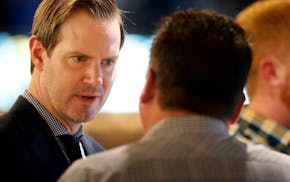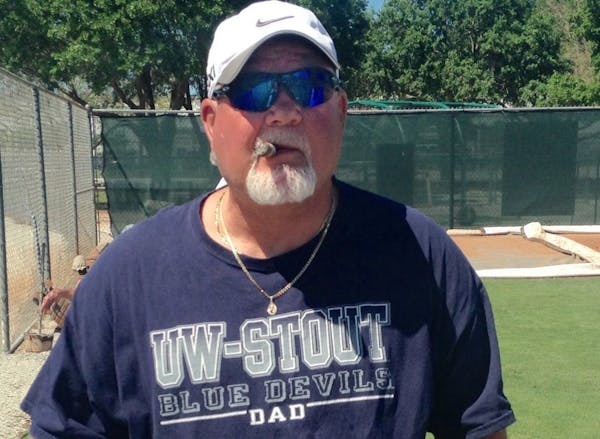FORT MYERS, FLA. – Eddie Guardado was in spring training with the Seattle Mariners in Arizona on March 17, 2005. He did not join the clubhouse gathering to watch the testimony by Mark McGwire, Sammy Sosa and Rafael Palmeiro at a congressional hearing into steroid use in baseball.
"I did watch the highlights that night," Guardado said. "I saw 'The Point.' That's what everybody remembers … 'The Point.' "
'The Point' was the emphatic gesture by Palmeiro in a prepared statement that opened, "Let me start by telling you this: I have never used steroids, period. I don't know how to say it any more clearly than that. Never."
Five months later, Palmeiro had a positive test for a performance enhancer — he claimed it was a tainted vitamin injection — and his pointed gesture toward members of Congress became a symbol of the hypocrisy of baseball's Steroids Era.
How hypocritical? Even after the embarrassment of McGwire refusing to answer questions about steroid use as a player, even after Commissioner Bud Selig and MLB Players Association Director Don Fehr were made to play fools in front of Congress, the suspension served by Palmeiro for his positive test in August 2005 was 10 days.
Ten.
The suspension for a first positive test for PEDs today is 50 games.
The Twins had a home game at Hammond Stadium on that St. Patrick's Day in 2005. Torii Hunter said players crowded around a TV and winced as Palmeiro pointed, McGwire refused and Selig and Fehr squirmed.
"I still was in shock from the steroids screening that had taken place before that," Hunter said. "When they did the drug screening of the 40-man rosters and said if 5 percent or more were positive there would be official testing, my reaction was: "There's no way 5 percent of the players are using.'
"When it came out way higher than 5 percent … that taught me one thing: Everybody has secrets. Everybody."
Paul Molitor, the Twins' first-year manager, was in the early portion of his 21-season big-league career when baseball went through its cocaine scandal in the 1980s. He testified in a case before a grand jury in Milwaukee.
He has said his issues back then might assist him in being a manager today — to talk from experience if there's a player perhaps headed for trouble.
Selig was Molitor's boss as owner of the Brewers during the cocaine scandal. Twenty years later, he was the commissioner being overwhelmed by a steroids scandal doing much more damage to the game.
The 10th anniversary of the congressional hearing was mentioned to Molitor on Tuesday. He was asked what his reaction was then, as a player already in the Hall of Fame.
"I think we all knew that there was something going on," Molitor said. "I also thought whatever actions players had taken, it would come back to bite them eventually.
"The congressional hearing intensified the spotlight on steroids. Mr. Selig and baseball were going to do what they had to do to after that. They were prepared to see people start to fall."
Was getting a full-fledged drug-testing system (with meaningful discipline) for those caught the No. 1 achievement of Selig's long tenure as commissioner?
"People can say legitimately that the Commissioner's Office and certainly the Players Association were late to address the steroid problem," Molitor said. "Once Bud decided that he had to stop it, he took on PEDs aggressively.
"If you look at it over the course of time, you could say taking meaningful action against PEDs was Bud's top achievement."
Looking back a decade, Hunter admits to being astounded at the cooperation on PED testing.
"They take our blood now and test that," he said. "Are there any other businesses in the country where the employees give their blood for testing? We have Olympic-style testing.
"You see somebody hit a bomb now, you can pretty well be sure it was all him, not steroids."
Guardado said there was a time during his career when he considered taking steroids, to get a little more fastball to go with that little slider.
"But I didn't want to do it, and you know why?" Guardado said. "Because I wanted to tell the truth if my son to ask me some day, 'Hey, Dad, did you use that stuff?'
"I wanted to be able to say, 'No,' and know that I was telling truth. And, by the way, that conversation happened a few years ago … exactly like that."
Patrick Reusse can be heard 3-6 p.m. weekdays on AM-1500.

Reusse: Wolves need stopper for Booker? NAW, it's not a problem.

Reusse: Success on court helped Timberwolves do strong business

Reusse: Taylor's story. 'I just bought the Minnesota Timberwolves.'

Reusse: Back from injury, Towns doesn't have to carry load


